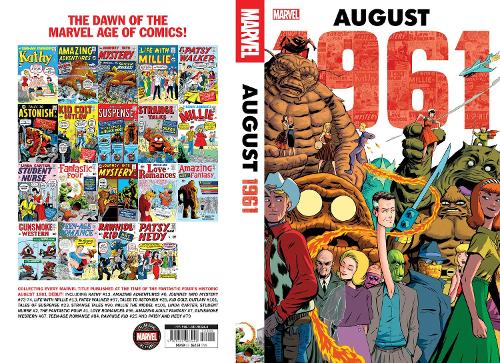
MARVEL: AUGUST 1961
(Paperback)
Available Formats
Hardback
Published: 13th May 2025
Hardback
Published: 27th May 2025
Hardback
Published: 25th July 2023
Paperback
Published: 28th July 2020
Hardback
Published: 27th January 2015
Hardback
Published: 24th February 2015
Hardback
Published: 19th February 2003
Paperback
Published: 4th October 2016
Hardback
Published: 6th February 2024
Hardback
Published: 5th March 2024
Hardback
Published: 9th July 2024
Paperback
Published: 9th April 2024
Paperback
Published: 1st October 2024
Hardback
Published: 16th July 2025
Hardback
Published: 17th September 2025
Publishing Details
MARVEL: AUGUST 1961
By (Author) Stan Lee
Illustrated by Jack Kirby
Marvel Comics
Marvel Comics
1st October 2024
6th August 2024
United States
Classifications
General
Fiction
Graphic novel / Comic book / Manga: Superheroes and super-villains
741.5973
Physical Properties
Paperback
520
Width 168mm, Height 259mm
369g
Description
The month of August in 1961 was one of the most momentous in Marvels history, laying the foundation for pop culture as it exists today and this collection includes every comic book that released in that fateful month!
In August 1961, FANTASTIC FOUR #1 hit newsstands, heralding a new take on super hero stories and the birth of the Silver Age Marvel Universe! But Marvel Comics had been around for years before that, publishing Western, romance, comedy, monster and science fiction titlesand in August 1961, FANTASTIC FOUR was just one of over a dozen very different Marvel books! Now, sixty years later, experience the excitement of being a comic book fan in that momentous month - with a complete collection of every issue that shared the shelves with FF #1, many never before reprinted!
COLLECTING: Journey Into Mystery (1952) 73-74; Kathy (1959) 13; Life with Millie (1960) 13; Patsy Walker (1945) 97; Amazing Adventures (1961) 6; Fantastic Four (1961) 1; Kid Colt, Outlaw (1949) 101; Linda Carter, Student Nurse (1961) 2; Millie the Model (1945) 105; Strange Tales (1951) 90; Tales of Suspense (1959) 23; Tales to Astonish (1959) 25; Gunsmoke Western (1955) 67; Love Romances (1949) 96; Teen-Age Romance (1960) 84; Amazing Adult Fantasy (1961) 7; Patsy and Hedy (1952) 79; Rawhide Kid (1960) 25
Author Bio
Writer/editor Stan Lee (1922-2018) made comic-book history together with Jack Kirby in 1961 with Fantastic Four #1. The monumental popularity of its new style inspired Lee to develop similarly themed characters including the Hulk and X-Men with Kirby, Spider-Man and Doctor Strange with Steve Ditko, and Daredevil with Bill Everett. After shepherding his creations through dozens of issues in some cases a hundred or more Lee allowed other writers to take over, but he maintained steady editorial control. Eventually, he helped expand Marvel into a multimedia empire. In recent years, his frequent cameo appearances in Marvels films established Lee as one of the worlds most famous faces.
Born Jacob Kurtzberg in 1917 to Jewish-Austrian parents on New Yorks Lower East Side, Jack Kirby came of age at the birth of the American comic book industry. Beginning his career during the rising tide of Nazism, Kirby and fellow artist Joe Simon created the patriotic hero Captain America. Caps exploits on the comic book page entertained millions of American readers at home and inspired U.S. troops fighting the enemy abroad. When World War II ended, the publics interest in super heroes waned; Kirby turned his artistic talents during the 1950s to other genres, such as monsters, Westerns and crime as well as the first-of-its-kind Young Romance Comics. In 1961, Kirby returned to super heroes to illustrate what would become the defining issue in Marvel Comics history: Fantastic Four #1. Written by Stan Lee, the teams debut revolutionized the industry overnight. In contrast to the staid artwork of his predecessors, Kirbys illustrations seemed to leap off the page with eye-popping action and drama. For the next decade, Kirby and Lee would introduce a mind-boggling array of new characters including the Avengers, the Hulk, Thor, Iron Man, the Silver Surfer and the X-Men. Taken together, Kirbys groundbreaking work with Lee formed the foundation of the Marvel Universe. In the early 1970s, Kirby moved to DC Comics, where his boundless creativity continued. He returned to Marvel in 1975, writing and illustrating Captain America and introducing his final major concept, the Eternals. With the explosion of TV animation during the 1980s, Kirbys talents turned to the small screen. Comic fans quickly recognized his work on such series as Thundarr the Barbarian and Turbo Teen. Kirby died in 1994, but his influence on the comic book industry is as strong as ever. His work has inspired a generation of professional artists and modern writers who continue to explore his vast universe of concepts and characters.
